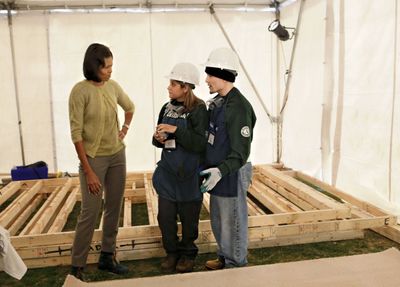Service: The new work
Beefed-up federal program adds incentives to volunteering

The job market for the newly laid-off and soon-to-be college graduates is the worst in years. So if you’re one of those seeking but not finding work, what can you do?
Consider volunteering.
It’s good for the soul, and, thanks to legislation recently passed by Congress and expected to be signed by President Barack Obama, it could be good for your finances.
The legislation would more than triple the size of AmeriCorps – sort of the internal Peace Corps for the United States – and create two other programs geared for the oldest and youngest of volunteers. The programs can help you pay off student loans or assist with college tuition for yourself or, in certain cases, for your child or grandchild.
“This is the biggest expansion since AmeriCorps was created” in 1993, says Alan Solomont, chairman of the Corporation for National and Community Service, which oversees AmeriCorps and other national volunteer programs.
AmeriCorps now has 75,000 volunteer positions. The legislation would raise that number to 88,000 next year and gradually increase it to 250,000 by 2017.
AmeriCorps volunteers who complete their service are eligible for an education award that can be applied to future college tuition or to repaying federal student loans. The legislation would raise that award from $4,725 to $5,350, the first increase since the program started.
AmeriCorps volunteers can be as young as 17. The legislation also seeks to encourage volunteerism among baby boomers and youngsters with two new programs.
The Silver Scholars program would be open to those 55 or older. Volunteers must complete 350 hours of service to receive a $1,000 education award that they can use to go back to school, or they can transfer the money to a child or grandchild for education expenses.
This is likely to be popular with retirees or laid-off workers who want to help a grandchild with college expenses but don’t have much money, says Mark Kantrowitz, publisher of FinAid, an online source for financial-aid information.
“It’s a way to give back to the community and get some money to give to a grandchild,” he says. “You can do two good things instead of one.”
The other new program is Summer of Service for middle school and high school students. Young volunteers, from sixth-graders to high school seniors, can earn education awards worth $500, or $750 if they’re financially disadvantaged, that can be applied to college tuition.
The expansion of national service comes at a time when applications are up. AmeriCorps applications reached 9,731 in February, more than three times the number for the same month last year.
Solomont says the jump in interest stems from Obama’s call for national service, a growing compassion among young people and the weak job market.
AmeriCorps volunteers serve thousands of programs across the United States, sometimes tutoring students, building low-income housing or assisting in the aftermath of disasters. Full-time volunteers, who typically get a stipend along with the education award, can learn skills that will help them in the work force.
“You’re not going to get wealthy on this,” Kantrowitz says, but “with the economy the way it is, if you can’t find a job, you might as well do some community service.”